Recent NOAA research forecasts that three high-value groundfish species will migrate toward deeper offshore waters along the United States West Coast due to climate change in the near future, which will likely require fishery managers to adapt their strategies in response.
NOAA’s study, “Species redistribution creates unequal outcomes for multispecies fisheries under projected climate change” was published in the peer-reviewed journal Science Advances in August 2023. It shows that sablefish, dover sole, and shortspine thornyhead are projected to migrate to deeper offshore waters, posing challenges for fishers that may need to travel longer distances and fish at greater depths or shift their operations completely to target more accessible species.
“Together, these are a large proportion of the groundfish caught off the West Coast, so they provide some indication of how things may change and the choices those changes present for the fishing community,” Northwest Fisheries Science Center Research Scientist Owen Liu, an author of the study, said. “This may not be good news for the fisheries, but it hopefully provides some foresight into how distributions may shift and gives fisheries time to consider how to adapt to these changes.”
Under guidance of the Northwest Fisheries Science Center – a NOAA facility based in Seattle, Washington, U.S.A. – researchers investigated the behavior of sablefish, dover sole, shortspine, and longspine thornyhead. These species collectively account for 53 percent of U.S. West Coast groundfish revenue over the past decade, but climate models tracking the California Current – the current that most affects West Coast waters – indicate an anticipated rise in ocean temperature alongside decreasing oxygen levels.
“Our species distribution models estimate the direction and velocity of species distributions in the coming decades,” Liu said. “Those results show that the preferred habitats of many groundfish species are changing in space and time.”
Specifically, the research forecasts a decrease in the abundance of sablefish and shortspine thornyhead, a mixed outlook for dover sole, and an increase in longspine thornyhead. In other words, all species except longspine thornyhead will shift their habitats toward deeper offshore waters.
This poses a significant challenge, as 20 or so miles off of U.S. West Coast waters lies the steep drop off of the continental shelf, resulting in a substantial increase in seafloor depth toward which these species may shift. This not only lengthens travel distances for fishers from their home port but also raises concerns about the efficiency of standard bottom trawling gear at these increased depths.
The current groundfish management plan for the West Coast also prohibits fishing below 700 fathoms, or about 0.8 miles, raising concerns that the majority of sablefish and shortspine thornyhead may descend below that level.
Therefore, fishery managers must rethink regulations to balance preservation of stocks and their habitats with ensuring revenue.
“The restriction on fishing deeper than 700 fathoms was initially established to ‘freeze the footprint’ of trawl fishing. [As a result], there was very little, if any, historical trawl fishing in deeper areas,” Liu said. “This past behavior suggests that fishers never considered fishing below 700 fathoms desirable, so even if valuable species like sablefish shift to these depths, we don’t know if fishers would find fishing them at such depths worth it.”
If fishers decide to switch target stocks – a trend already observed in the northern regions of the West Coast where fishers have started to go after species such as octopus – instead of pursuing species at increased depths, they face …
Photo courtesy of NOAA Fisheries








